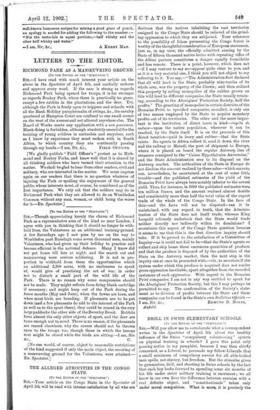THE ALLEGED ATROCITIES IN THE CONGO STATE. [To THE EDITOR
OF THE "SPECTATOR:1 SIR,—Your article on the Congo State in the Spectator of April 5th will be read with intense satisfaction by all who are desirous that the natives inhabiting the vast territories assigned to the Congo State should be relieved of the grind- ing oppression to which they are subjected. Your reference to the possibility of Islam permeating the Congo forest is worthy of the thoughtful consideration of European statesmen, just as, in my view, the officially admitted arming by the State of fifteen thousand native levies with repeating rifles of the Albini pattern constitutes a danger equally formidable and less remote. There is a point, however, which does not —if I may venture to say so—appear quite clear to you, and as it is a very material one, I think you will not object to my referring to it. You say,—" The Administration first declared that all wild land in the State, probably nine-tenths of its whole area, was the property of the Crown; and then utilised this property by selling monopolies of the rubber grown on this wild land to different companies, the State usually retain- ing, according to the Aborigines' Protection Society, half the profits." The granting of monopolies in certain districts of the Domaine Prive to specified companies, so-called, is only one of two means employed by the State to acquire monetary profits out of its territories. The other and the more impor- tant is the institution of direct taxes in kind—imp6ts de nature—upon the native population, wherever it can be reached, by the State itself. It is on the proceeds of this direct taxation—paid in ivory and rubber—that the State exists. Its agents in Africa collect it, send it down the river and the railway to Matadi, the port of shipment to Europe, where it is placed on board the regular Antwerp line of steamers consigned to the " Caisse Hypothecaire Anversoise," and the State Administration sees to its disposal on the Antwerp market. The authorities of the State in Europe do not disclose the amount realised by these sales—which amount can, nevertheless, be ascertained at the cost of some little trouble—and the published estimates of the yield of the Domaine Prive have always been notably inferior to the actual yield. Thus, for instance, in 1899 the published estimates were ten million francs, and the amount realised almost double and considerably more than half the total value of the export trade of the whole of the Congo State. In the face of this—and the facts will not be disputed—can it be maintained, with any regard to truth, that the Adminis- tration of the State does not itself trade, whereas King Leopold solemnly undertook that the State would trade neither directly nor indirectly within its dominions P I accentuate this aspect of the Congo State question because it seems to me that this is the first direction inquiry should take. If it be proved to the satisfaction of a Committee of Inquiry—as it could not fail to be—that the State's agents so collect and ship home these enormous quantities of produce, and that the produce is disposed of by the authorities of the State on the Antwerp market, then the next step in the inquiry can at once be proceeded with,—viz., to ascertain if the system under which this produce is acquired does not render gross oppression inevitable, apart altogether from the recorded instances of such oppression. With regard to the Domaine Prive companies, I am not in any way entitled to speak for the Aborigines' Protection Society, but this I may perhaps be permitted to say. The confirmation of the Society's state- ment as to division of profits between the State and these companies can be found in the State's own Bulletins Officiels.—










































 Previous page
Previous page